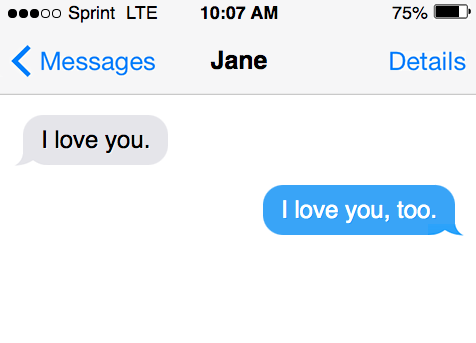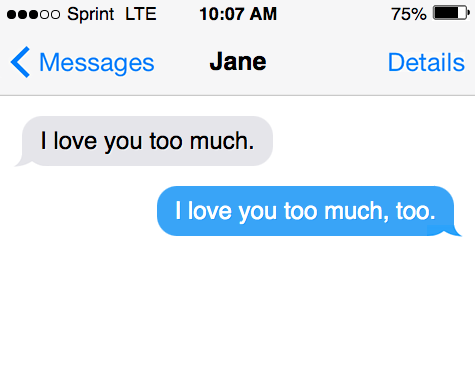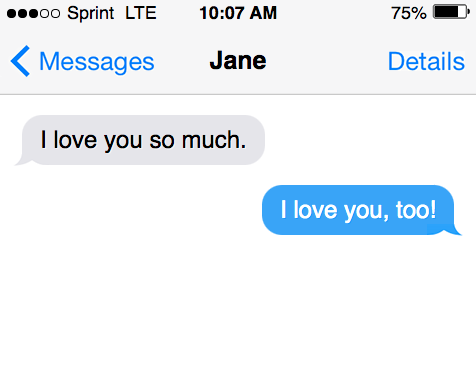Is it “I love you too” or “I love you to?” Is there a comma between the words “you” and “too?” These words are pronounced the same. And sound the same. Although, they have drastically different meanings.
Understanding “to” vs “too”
It’s critical to understand the difference between “to” and “too.” The word “to” is a preposition with several meanings. Typically, it means “toward” or “until.” For example, “I need to get the car.” In this sentence, the word “to” indicates “toward.” Or to break down the sentence, “I need to get toward the car.”
The word “too” is an adverb that means “excessively” or “also.” For example, “I need to get the car, too.” In this sentence, the word “too” indicates that the person will join someone in getting the car.
The two words mean entirely different meanings. “To” is a preposition and part of an infinitive verb in American English.
“Two” as a word also sounds very similar to the words “to” and “too.” Those are called pronunciation homophones. And can get confused when going through the American English language learning process.
Remember, “too” means to join or accompany. It can mean “also” or something to an excessive degree. While “to” is an infinitive verb, meaning to “toward” or “continue.”

Sample sentences
- “I want to get to the park so we can have fun today.” (The word “to” getting used as “toward.”)
- “I want to go to the park, too.” (The word “too” meaning “also.”)
- “I’m glad to help.” (The word “to” is getting used a preposition.)
When to use “you too”
Common grammar mistakes for the phrase “you too” typically include not adding the second letter “o” to the word “too.” To build a correct sentence using the word “too,” it’s important to remember that it typically can get replaced with the words “also,” “very,” or “excessively.”
For example, “I want you to go to the park, too.”
“You too” as a phrase should get used any time the writer or person wants to say “also.” If they want someone to have a good day, also. Or want someone to head in the right direction, also. A comma can come before the word “too.” For example, “I’d love for you to come, too.”
In this sentence, the person is agreeing or saying, “also.”
Examples
- Incorrect example: “I’d truly enjoy it if someone from the HR department could accompany me to the trade show to.”
- Correct example: “I’d truly enjoy it if someone from the HR department could accompany me to the trade show too.”
When to use “you to”
To make sense of where to use the phrase “you to,” it’s important to consider the entire structure of the sentence. To correctly write “you to” in a sentence, it’s important to remember the meaning of the word “to.” It means to continue or forward.
For example, “I want you to go to school.” In this sentence, a parent could ask their child to go to school. They are asking them to move forward in the entire sentence.
Examples
- Incorrect example: “I want you too go to the park and have fun playing with your friends.”
- Correct example: “I want you to go to the park and have fun playing with your friends.”
Different meanings
“You too” and “you to” mean entirely different things. It’s important to use the correct phrase when constructing a sentence. While “too” and “to” sound the same and are pronounced the same (as well as the number “two” in American English), each word has entirely different definitions.

Is it “I love you too” or “I love you to?”
The correct way to tell someone that you love them as well is to say, “I love you too.” This is the correct phrase because the word “too” is acting as the word “also.”
For example, if someone says, “I love you.” And the response is, “I love you too.” Then that’s the correct way that native English speakers would reply with the idea of affection and love.
An incorrect example of a response would be, “I love you to.” The word “to” would intend to say “forward.” And the sentence would read like the following, “I love you go.”
Grammar tip: It’s a common grammar rule to never end a sentence with a preposition. Making “too” the correct word to use.
Sentence examples
- “I love you, too. It’s the best feeling in the world.”
- “I’m so happy that you shared your feelings with me. I love you, too!”
When to use “I love you to”
It’s far less common to say “I love you to.” It’s not the correct phrasing for any type of statement. The variation of the statement would be, “I’d love you to.” Which is typically followed by more words.
For example, “I’d love for you to join us on this adventure.”
Is it “I love you too” or “I love you, too?”
Using a comma before the word “too” is most common. Commas help to add a pause to the statement. Generally, when replying with love and affection, it’s better to answer with a small pause. That emphasis makes the entire sentence sound structurally correct when someone repeats it to themselves.
For example, “I love you, too.” Is the proper grammar and punctuation for replying to someone who said, “I love you.”
Another way this can appear is when the clause is not complete in a sentence. In that scenario, the comma would get removed before the word “too.” For example, “I love you too, and I want to tell this to you every day. I hate that I can’t.”

When to use “I love you too”
“I love you too” has a place. For example, when in a relationship with a partner. This proper grammar is typically found when using the word “too” to describe something excessively.
For example, “I love you too much. I can’t hold back any of my feelings.”
In that scenario, the person is trying to convey an excessive amount of love that they feel toward the other person. This phrase is commonly found when speaking English.
Want a simple “I love you,” suffice? When the word “too” is necessary as an intensifier, then choose the first sentence, but with a comma after the word “you.”
Sentence examples
- “I love you too much it’s going to hurt when you have to leave.”
- “I love you too so much, I can’t wait to see you.”
Is it “I love you, name” or “I love you name?”
Is there a comma before saying a persons name in the phrase, “I love you too.” When speaking to a person, it’s correct grammar and punctuation to say, “I love you too, Jeff.” Typically, this phrase is found when responding to someone. Instead, an exchange of affection and love.
This can be confusing since “I love you, too” is correct. Remember that when a clause is not complete, then the comma gets removed. The person’s name acts as the complete clause in context.
For example, “I love you, too, Andy.” This sentence would be wrong because it uses one additional comma than it requires.
The proper way to write this would be, “I love you too, Andy.”
This conveys the same emotions and follows the rules of English Grammar.
Sentence examples
- “When people love each other, this must be how it feels. I hope this isn’t stupid love. I love you too, Jeff.”
- “I got your message the other day. And it made me smile. I stopped for a moment to think about you. I love you too, Samantha.”
Other common phrases
- “I miss you too” or “I miss you to?” Someone would never technically miss another person “forward.” Meaning, “I miss you too” is the correct spelling.
- “I love you, too” as a formal way of saying, “I love you.” The pause with the comma does not indicate formality. It adds pause for the person to hear emphasis as they repeat the sentence to themselves. When writing “I love you, too” as a response, it’s proper grammar to use a comma before the word “too.”
Sources
- To Definition & Meaning – Merriam-Webster
- Too Definition & Meaning – Merriam-Webster
- What’s the Difference Between To and Too? – YourDictionary
- Proposition Definition & Meaning – Merriam-Webster
- Infinitive Verb – YourDictionary
- Infinitives // Purdue Writing Lab
- Grammar Clauses in English Made Easy
- Intensifiers ( very, at all ) – English Grammar Today
Inside this article
Fact checked:
Content is rigorously reviewed by a team of qualified and experienced fact checkers. Fact checkers review articles for factual accuracy, relevance, and timeliness. Learn more.
Core lessons
Glossary
- Abstract Noun
- Accusative Case
- Anecdote
- Antonym
- Active Sentence
- Adverb
- Adjective
- Allegory
- Alliteration
- Adjective Clause
- Adjective Phrase
- Ampersand
- Anastrophe
- Adverbial Clause
- Appositive Phrase
- Clause
- Compound Adjective
- Complex Sentence
- Compound Words
- Compound Predicate
- Common Noun
- Comparative Adjective
- Comparative and Superlative
- Compound Noun
- Compound Subject
- Compound Sentence
- Copular Verb
- Collective Noun
- Colloquialism
- Conciseness
- Consonance
- Conditional
- Concrete Noun
- Conjunction
- Conjugation
- Conditional Sentence
- Comma Splice
- Correlative Conjunction
- Coordinating Conjunction
- Coordinate Adjective
- Cumulative Adjective
- Dative Case
- Determiner
- Declarative Sentence
- Declarative Statement
- Direct Object Pronoun
- Direct Object
- Diction
- Diphthong
- Dangling Modifier
- Demonstrative Pronoun
- Demonstrative Adjective
- Direct Characterization
- Definite Article
- Doublespeak
- False Dilemma Fallacy
- Future Perfect Progressive
- Future Simple
- Future Perfect Continuous
- Future Perfect
- First Conditional
- Irregular Adjective
- Irregular Verb
- Imperative Sentence
- Indefinite Article
- Intransitive Verb
- Introductory Phrase
- Indefinite Pronoun
- Indirect Characterization
- Interrogative Sentence
- Intensive Pronoun
- Inanimate Object
- Indefinite Tense
- Infinitive Phrase
- Interjection
- Intensifier
- Infinitive
- Indicative Mood
- Participle
- Parallelism
- Prepositional Phrase
- Past Simple Tense
- Past Continuous Tense
- Past Perfect Tense
- Past Progressive Tense
- Present Simple Tense
- Present Perfect Tense
- Personal Pronoun
- Personification
- Persuasive Writing
- Parallel Structure
- Phrasal Verb
- Predicate Adjective
- Predicate Nominative
- Phonetic Language
- Plural Noun
- Punctuation
- Punctuation Marks
- Preposition
- Preposition of Place
- Parts of Speech
- Possessive Adjective
- Possessive Determiner
- Possessive Case
- Possessive Noun
- Proper Adjective
- Proper Noun
- Present Participle
- Prefix
- Predicate



